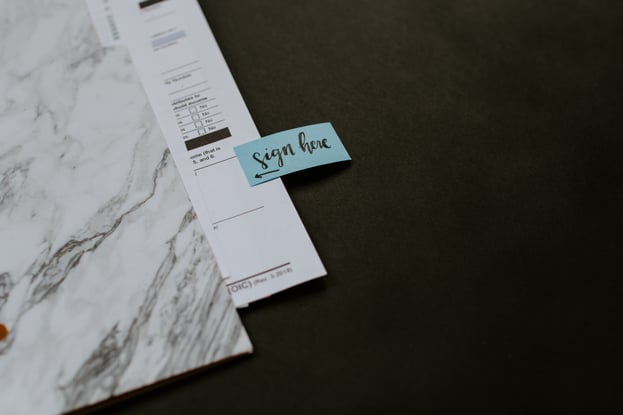
You’ve found the home of your dreams! After you are under contract and approved for your loan, now all that’s left to do is close. But what happens on closing day? Many are nervous and expect a frightful process filled with rude, scary attorneys. Never fear! Below we explain just what you can expect during your closing appointment to prepare you and more importantly, ease your mind.
Closing on a home usually takes place 3-6 weeks after the offer is accepted. The actual closing appointment is allotted a 60 minute time slot. If both the buyer and seller are in full agreement and both understand all the documents they will be signing, then it should go quickly. Please let us know ahead of time if you wish to have longer to look over the documents so that we can properly accommodate you.
All parties necessary to the closing must attend. This is usually the buyer, seller, their respective spouses, real estate agents, and of course the attorney. If you are unsure of who you need to have with you, give us a call. This is supposed to be a celebration. You can bring your favorite person if you want!
To ensure the closing process runs smoothly, be sure to have the following documents with you at your appointment.
Failure to bring any of the above may result in delays to closing on your home.
Speaking of setbacks, yes, things can go wrong at closings causing delays to you finally getting the keys. However, simply knowing where the most common setbacks occur will help you avoid timely mistakes. The most common hold-ups that our real estate attorneys at Shepard Law see are as follows:
One of the most common obstacles that arise during closing is missing signatures. All parties that are necessary to the closing must be there to sign the appropriate documents. This may sound obvious but there are misconceptions about this, particularly when it comes to couples. Many couples think that only the one borrowing money for the home needs to be at the closing meeting. However, it is often that the non-borrowing spouse will need to be present to sign documents pertaining to homeownership. Consult with your attorney beforehand to determine who should be there on closing day.
Something that often causes a delay is government issued IDs, namely when your state-issued ID is expired. Be sure to bring a renewed license to your closing appointment to avoid this kind of setback. Some lenders also require a second form of identification, so it’s wise to bring a passport, social security card, or student/employer ID.
Another important aspect of closing is the payment method and amount to close your home. Cash to Close and closing costs vary widely but the exact payment amount will be outlined in the closing disclosure, which you should have received from your lender at least three days before closing. If you have not, we will work with you to get you the information you need.
Not only should the amount be correct, but the appropriate payment method must be used as well. If the amount is under $500, a personal check is acceptable. Cash is never accepted, as lenders and regulators require a paper trail. If the amount is over $500 but less than $5,000 then you may pay via certified funds. If the amount is over $5,000, then you must pay by wire transfer. Using the wrong form of payment can certainly cause a delay in the closing process, so be sure to prepare your funds accordingly.
Here at Shepard Law, we bring over 20 years of legal experience to your closing ensuring all legal requirements are met and all the money is collected and dispersed appropriately. We know the closing process can be stressful and tiresome which is why we do everything in our power to make it all happen as quickly and smoothly as possible.
Our office is warm and welcoming, complete with snacks, drinks, and friendly service so you can feel comfortable throughout the process. If you are preparing to close on your home in North Carolina, then we hope you will think of us for your legal needs. Give us a call anytime.
8520 Cliff Cameron Drive, Suite 190
Charlotte, NC 28269
Phone: 704-769-3100
Fax: 704-954-8668
General Inquiries: info@shepardlawpllc.com
New Contracts: closings@shepardlawpllc.com